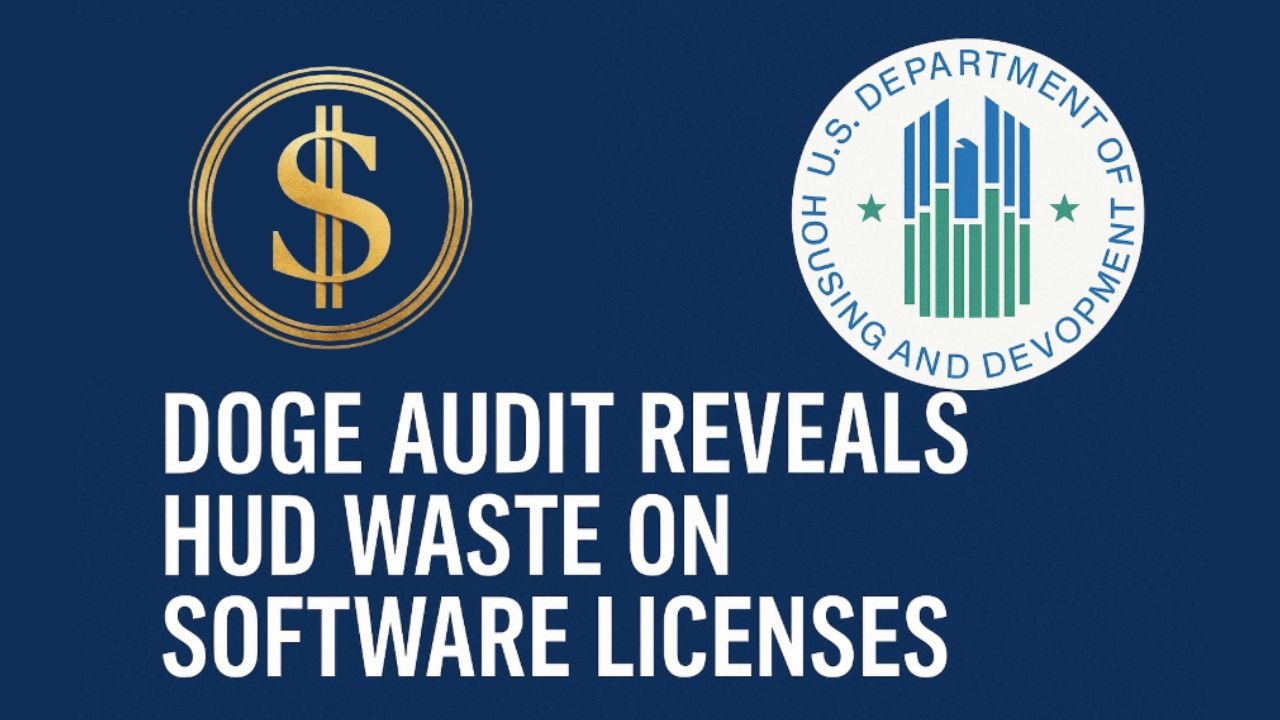News
DOGE Audit Reveals HUD Waste on Software Licenses

The U.S. Department of Housing and Urban Development (HUD) has come under review after a new audit revealed massive waste involving unused software licenses. The audit was conducted by the Department of Government Efficiency (DOGE), a team focused on cutting government spending and improving transparency in public programs. The findings have raised concerns about how federal agencies manage digital tools and taxpayer money.
According to a post shared by DOGE on X (formerly Twitter), HUD had paid for thousands of software licenses that were not being used. For example, the report noted that HUD owned 11,020 Adobe Acrobat licenses, but none of them had any active users. This alone reflects a major gap between the number of licenses purchased and the actual demand for them within the agency.
HUD completed the same audit. Initial findings on paid software licenses:
– 35,855 ServiceNow licenses on three products; only using 84
– 11,020 Acrobat licenses with zero users
– 1,776 Cognos licenses; only using 325
– 800 WestLaw Classic licenses; only using 216
– 10,000 Java… https://t.co/xnY8TkLmM3— Department of Government Efficiency (@DOGE) March 6, 2025
DOGE’s review did not stop there. The audit also uncovered that HUD had purchased 35,855 licenses for ServiceNow products, yet only 84 were in use. ServiceNow is an IT management platform used by many businesses and government offices. It is meant to improve workflow and track service requests. However, the extremely low usage numbers at HUD raise questions about why so many licenses were bought in the first place.
Other examples in the audit included 1,776 licenses for IBM Cognos, which is a business intelligence tool, with only 325 being used. Similarly, HUD had 800 WestLaw Classic licenses but was only using 216. Another major finding was 10,000 Java licenses, of which only 400 were in use.
DOGE shared these numbers publicly and stated that actions were already being taken to fix the issue. “All are being fixed,” the post said, suggesting that steps were being taken to cancel, reduce, or reassign these licenses.
HUD responded to the audit shortly afterward. In a statement provided by HUD spokesperson Kasey Lovett, the department said, “The HUD-DOGE taskforce is actively working to remedy this waste of taxpayer dollars.” Lovett also said that HUD is taking inventory of every dollar spent and is committed to streamlining operations under the Trump administration’s push to make the government more efficient.
Tech entrepreneur Elon Musk also commented on the audit. He wrote, “There are vast numbers of unused software licenses in every part of the government. Your tax dollars are being wasted.” Musk has supported DOGE’s work and has called for smarter use of public resources across federal agencies.
This is not the first time DOGE has reported on software license waste. Similar findings were made at other government agencies, including the General Services Administration (GSA), the Department of Labor (DOL), the Small Business Administration (SBA), and the Social Security Administration (SSA).
At GSA, for example, DOGE found that the agency, which has around 13,000 employees, was using 37,000 WinZip licenses. There were also 19,000 training software subscriptions and multiple overlapping platforms for employee education. The audit revealed that one division of GSA with 5,500 employees had 7,500 project management software seats. On top of that, three different ticketing systems were being used at the same time, creating confusion and extra costs.
In response to the audit, the GSA took immediate action. Within hours of DOGE’s post, the agency announced plans to cut $5.5 million in IT spending. GSA Deputy Administrator Stephen Ehikian confirmed the changes and said the team was working to identify even more savings. A few days later, DOGE reported that GSA had deleted over 114,000 unused software licenses and shut down 15 software products that were either underused or redundant. This saved the agency $9.6 million per year.
HUD completed the same audit. Initial findings on paid software licenses:
– 35,855 ServiceNow licenses on three products; only using 84
– 11,020 Acrobat licenses with zero users
– 1,776 Cognos licenses; only using 325
– 800 WestLaw Classic licenses; only using 216
– 10,000 Java… https://t.co/xnY8TkLmM3— Department of Government Efficiency (@DOGE) March 6, 2025
These actions show that DOGE is not just sharing information—they are helping drive change across the government. They have encouraged agencies to take a closer look at how software is being purchased and used. Instead of buying more licenses than needed, agencies are being asked to match purchases to real demand.
DOGE has also stated that many federal departments have more software licenses than employees, and that some licenses are paid for but not even installed. This waste adds up quickly, especially when large-scale software agreements are made without ongoing reviews.
The goal of the DOGE software licenses audit HUD findings is not only to highlight problems but also to push for real improvements. By cutting waste, the government can free up funds for more important services and reduce the burden on taxpayers.
The recent DOGE audit has shown that HUD, like several other government agencies, has been spending millions of dollars on software licenses that go unused. Thanks to the audit and public pressure, agencies are beginning to respond. With better planning and active reviews, it is possible to make sure every dollar spent supports real work, not empty licenses.
-

 Entertainment1 month ago
Entertainment1 month ago123Movies Alternatives: 13 Best Streaming Sites in 2026
-

 Entertainment2 months ago
Entertainment2 months ago13 Free FMovies Alternatives to Watch Movies Online in 2026
-

 Entertainment1 month ago
Entertainment1 month ago13 Flixtor Alternatives to Stream Free Movies [2026]
-

 Entertainment1 month ago
Entertainment1 month agoGoMovies is Down? Here are the 11 Best Alternatives






